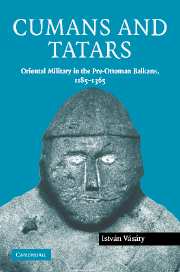Book contents
- Frontmatter
- Contents
- Preface
- 1 Introduction
- 2 Cumans and the Second Bulgarian Empire
- 3 Cumans in the Balkans before the Tatar conquest, 1241
- 4 The first period of Tatar influence in the Balkans, 1242–1282
- 5 The heyday of Tatar influence in the Balkans, 1280–1301
- 6 Cumans and Tatars on the Serbian scene
- 7 Cumans in Byzantine service after the Tatar conquest, 1242–1333
- 8 The Tatars fade away from Bulgaria and Byzantium, 1320–1354
- 9 The emergence of two Romanian principalities in Cumania, 1330, 1364
- Conclusion
- Appendix 1 List of geographical names
- Appendix 2 Chronological table of dynasties
- Appendix 3 Maps
- List of abbreviations
- Bibliography
- Index
4 - The first period of Tatar influence in the Balkans, 1242–1282
Published online by Cambridge University Press: 29 July 2009
- Frontmatter
- Contents
- Preface
- 1 Introduction
- 2 Cumans and the Second Bulgarian Empire
- 3 Cumans in the Balkans before the Tatar conquest, 1241
- 4 The first period of Tatar influence in the Balkans, 1242–1282
- 5 The heyday of Tatar influence in the Balkans, 1280–1301
- 6 Cumans and Tatars on the Serbian scene
- 7 Cumans in Byzantine service after the Tatar conquest, 1242–1333
- 8 The Tatars fade away from Bulgaria and Byzantium, 1320–1354
- 9 The emergence of two Romanian principalities in Cumania, 1330, 1364
- Conclusion
- Appendix 1 List of geographical names
- Appendix 2 Chronological table of dynasties
- Appendix 3 Maps
- List of abbreviations
- Bibliography
- Index
Summary
THE TATAR CONQUEST IN THE BALKANS
The age of Tatar influence in the Balkans lasted for over a hundred years, from the great Tatar campaign in 1242 till J̌ānibek Khan's reign (1342–57) in the Golden Horde. Then, owing to the growing anarchy within the Golden Horde, which led to total political confusion after Berdibek Khan's death (1259), the Tatar state lost all its influence and interest in the Balkans. This hundred-year period can be divided into three phases, the first characterised by the ever-growing power of Nogay, lord of the westernmost territories of the Golden Horde. The end of this phase can be marked by the deaths of three rulers of the area: the Bulgarian tsar Konstantin Tikh in 1277, the khan of the Golden Horde Mengü-Temür in 1280, and the Byzantine emperor, founder of the Palaiologos dynasty, Michael VIII, in 1282. The change of power in these countries led to the second phase, a period of weakening and decay in Bulgaria and Byzantium, while the power of the Tatar chief Nogay rose to unprecedented heights, such that very briefly his son was even able to occupy the Bulgarian throne. The heyday of Tatar influence in the Balkans ended with the deaths of Nogay (1300) and his son Čeke (1301). The last phase of the now fading Tatar presence in the Balkans fell between 1302 and the middle of the fourteenth century.
- Type
- Chapter
- Information
- Cumans and TatarsOriental Military in the Pre-Ottoman Balkans, 1185–1365, pp. 69 - 85Publisher: Cambridge University PressPrint publication year: 2005



